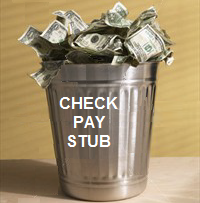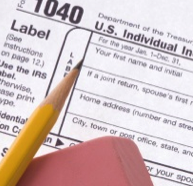
The Renters Tax Credit For Lower Income Earners

Car Insurance and Other Potential Vehicle Tax Deductions

Should I Use an Online Tax Software Program to File My Return?

There are only 2 weeks left until personal income tax returns are due on April 18th. As you might expect, many last minute taxpayers are finalizing theirs plans on how to prepare their return. While hiring a CPA or Enrolled Agent (EA) is typically the easiest and least risky way to file, it may not be the most economical. Instead, many taxpayers are likely seriously considering using an online tax software program (i.e. TurboTax or H&R Block Online) because they seem to be quick, easy and cheap or at least the commercials make it seem so. We decided to take a deeper look at the online tax software programs and see how they compare to using a CPA or Enrolled Agent. Read More.
I’m Due a Tax Refund for 2007, But I Never Filed. What Do I Do?

Sounds like you’re one of the lucky ones – more than 1 million people are owed more than $1.1 billion in tax refunds from 2007. The IRS estimates more than half of the refunds are for at least $640. In California alone, 124,000 people are owed refunds. But the clock is ticking, so you’d better act fast if you want your share of the cash. You need to file a return for 2007 no later than April 18, or your luck will run out. Read More.
Can Exercising Stock Options Trigger Alternative Minimum Tax?
I Forgot To Report Income On My Tax Return. What Should I Do?
Why did I receive a K-1 for my IRA when I haven’t liquidated it?

I Haven’t Received A Raise, So Why Is My Paycheck Bigger?

You may have missed it, but when Congress approved the Tax Relief, Unemployment Insurance Reauthorization and Job Creation Act of 2010 in December, which is commonly called the extension of the Bush tax cuts, it mandated a major cut in the Social Security tax you pay. Instead of forking out 6.2%, you now pay 4.2% for all wages earned up to $106,800. Read More.
Who Should Convert an IRA to a Roth?

Generally it makes sense to convert a traditional IRA to a Roth but there are so many variables that need to be considered to know for sure whether or not it is a smart move. So, let’s examine some situations in which it generally makes sense to convert. Read More.
I converted my IRA into a Roth IRA. How do I need to report it?

With a traditional individual retirement account, you’ve probably been able to sock away your money tax free, unless you take part in a qualified employer plan, like a 401(k). You also haven’t had to pay income tax on the earnings stemming from your IRA. For traditional IRAs, taxes kick in when you pull the money out of the account – usually after you retire and are in a lower tax bracket than you are today. Read More.




